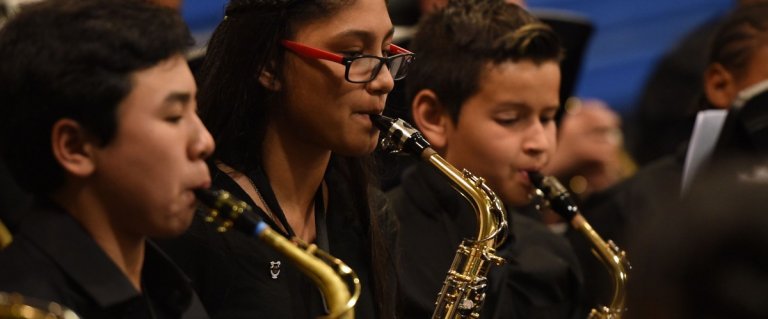
What’s expensive but has legions of parents willing to pay a hefty sum for their children to pursue?
Answer: Music tuition.
Part of this is owed to its reputation – some backed by evidence and some not – as a magic supplement that will improve reading, writing and counting among children. Then there’s “The Mozart Effect,” ie. the idea that listening to the Austrian composer’s works as a baby will make one more intelligent. For the parents looking to unlock the genius or protégé in their babies, spending a big chunk of their salaries on music lessons is a small price to pay.
But while music’s link with academic ability is well-reported – or as some will argue, over-reported or oversold – we often forget the non-academic perks of learning the piano or being a part of the band. After all, didn’t Aristotle once say:
“Music has the power of producing a certain effect on the moral character of the soul, and if it has the power to do this, it is clear that the young must be directed to music and must be educated in it.”
Beyond Aristotle there are other underrated benefits of learning music – backed by some good research to boot! – that might just make us reassess the real reasons why we should encourage our children to study music:
Several studies have found that listening to music and singing together can directly impact neuro-chemicals in the brain, many of which play a role in closeness and connection. One study found that performing music resulted in higher pain thresholds than listening to music alone. Higher pain thresholds is a proxy measure for increased release of endorphins, the neurochemical that triggers a positive feeling in the body and reduces your perception of pain.

Playing music together helps children work together within a diverse community. Source: AFP/Joshua Blanchard
Another study found that those singing together in a larger choir group experienced bigger changes in social closeness after singing than the smaller group.
Writing in The Conversation, Associate Professor in Music Therapy at the University of Melbourne said: “So when we sing in a choir, drum in an African drumming circle, scream in a karaoke room, or play in a garage band, we connect chemically with others.”
For schools, this means “making music with others doesn’t just strengthen existing networks, but it can also expand them by creating conditions where diverse groups of people can come together and transcend their differences, at least for a time,” McFerran wrote.
Instils discipline
Keys of Inspiration is a programme that runs in six US schools with limited resources. Students, even those from poor backgrounds, are given a chance to learn the piano as a means to social development, be more self-confident and gain a sense of achievement.
For 30 10-year old students who have gone through the programme, it’s also taught them discipline in a place where it can seem nearly impossible to do so. TES reported that these students are from a school in Harlem, New York, where 75 percent of students are eligible for free school meals and more than 50 percent do not hit state test standards.
Attending these lessons twice each week with a dedicated piano teacher is having effects like improved school attendance, better engagement with learning and change in class attitudes.
“[The piano lessons] give us inspiration, hard work and dedication.,” explains fifth-grader Lindell Raison.
Lang Lang, the concert pianist, founded and financed the programme, and believes in the broader benefits of teaching music in schools.
“As long as music tuition is done properly, you will see students learn how to focus, learn how to commit, learn how to be creative,” he says. “It teaches you logic. It can be very mathematical. And if you have a child struggling with a text, it can help to express that text through music, to use music as a medium of interpretation.
“If you want to be a lawyer, doctor, teacher, whatever the profession, if you can take the same process of making music, that dedication and willingness, you will succeed.”
“Fundamental” to creativity

Source: AFP/Anthony Wallace
In an IBM poll of 1,500 CEO, creativity is found to be the top qualification for future leaders. At the same time, however, creativity appears to be a resource in decline among our children, the very people who will lead us in the future. Since 1990, creativity scores for school children in America have been on a steady decline, around the same time music and arts programmes were removed from its public schools.
This is a shame considering the potential contributing power of music to the development and cultivation of creativity. Parag Chordia, Director of the Music Intelligence Lab at Georgia Tech, is researching the neurological roots of the creative process, and music is a key ingredient. Using tools like electroencephalograms (EEGs) and functional magnetic resonance imaging (fMRI), Chordia is investigating whether “real-time creativity”, like improvising in a jazz band, uses the brain in a different way.
Chordia says, “To be a great engineer; to really produce innovative products and to advance the frontiers of science, you have to be creative. And it’s not just that music is a diversion or an extracurricular, but it’s actually something that’s fundamental to life and mind.”
Liked this? Then you’ll love…
Why music matters to STEM students. Yes, STEM.
Does listening to music while studying make you a better student?







